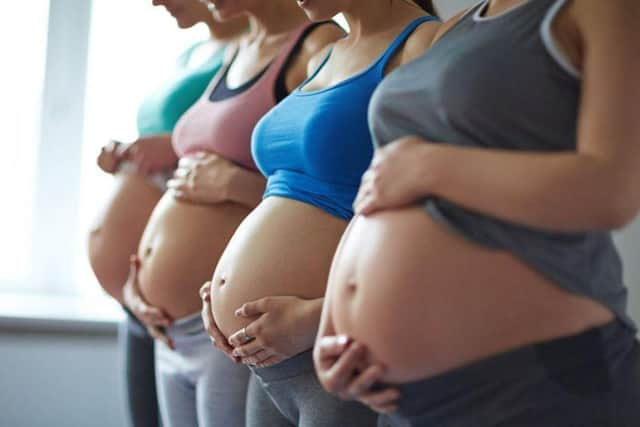Covid linked to stillbirths and ICU admissions in unvaccinated pregnant women, study finds
Experts urged women to take up the offer of a vaccine, as the “concerning” findings showed no increase in baby deaths or premature births in women who had been vaccinated during their pregnancy.
It comes after Public Health Scotland launched an investigation into newborn deaths after a larger-than-expected increase was recorded in September.
Advertisement
Hide AdAdvertisement
Hide AdWomen who had Covid in the final month of pregnancy are also more likely to be admitted to hospital or critical care, and twice as likely to deliver their baby prematurely, found the Edinburgh University-led study, published in Nature.


The majority of complications after infection occurred in unvaccinated women, who had received no dose or one dose fewer than 21 days previously.
In the study of almost 88,000 pregnant women between December 2020 and October last year, 77 per cent of Covid infections occurred in unvaccinated women, while 91 per cent of those admitted to hospital with the virus and 98 per cent of those admitted to critical care were not vaccinated.
Vaccination uptake was significantly lower in pregnant women than the rest of the population, with some 32 per cent of women who gave birth in October fully vaccinated, compared to 77 per cent of the general population of women aged 18 to 44.
Of the 2,364 babies born after their mother had a Covid-19 infection during pregnancy, 19 were either stillborn or died in the first four weeks of life.


All 19 mothers were unvaccinated.
In 14 of these cases, the mother had Covid in the final four weeks of pregnancy, meaning a mortality rate of 22.6 per 1,000 in this group, compared to 5.6 per 1,000 across all births.
There has been one death recorded in Scotland in a pregnant woman following Covid infection.
Experts said while it was not possible to determine whether Covid contributed directly to any deaths or premature births due to a lack of data, the findings underlined the importance of pregnant women being vaccinated.
Advertisement
Hide AdAdvertisement
Hide AdStudy co-lead Dr Sarah Stock of Edinburgh University, who is also a consultant obstetrician, said: “Covid-19 vaccination in pregnancy is crucial to protect women and babies from preventable, life-threatening complications of Covid-19.”
Scotland’s deputy chief medical officer Professor Nicola Steedman labelled the findings “concerning”, and urged pregnant women to get vaccinated “as soon as possible”.
Professor Marian Knight, professor of maternal and child population health at Oxford University, said: “This extremely robust, national, Scottish study very clearly shows the strong protective effect of vaccination against Covid-19 infection and its consequences.”
She added: “There is an urgent need to ensure that pregnant women can be enabled to receive vaccination wherever they receive care, including in antenatal clinics, in order to prevent further tragic losses of either mothers or their babies.”
Dr Rachael Wood, Consultant in Public Health Medicine at Public Health Scotland, said it is possible that very high Covid rates could have an impact on Scotland’s overall perinatal death rate, but there is currently no evidence of this in Scotland.
However, other factors associated with the pandemic may influence deaths, she said, including pressure on the NHS and other wider changes to women’s health.
A message from the Editor:
Thank you for reading this article. We're more reliant on your support than ever as the shift in consumer habits brought about by coronavirus impacts our advertisers.
If you haven't already, please consider supporting our trusted, fact-checked journalism by taking out a digital subscription.
Comments
Want to join the conversation? Please or to comment on this article.
